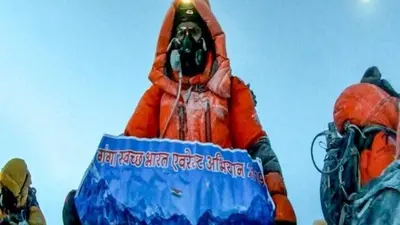Updated 5 June 2019 at 08:20 IST
IAS officer summits Everest with gangajal to spread awareness on 'Swachh Ganga'
Ravindra Kumar, an IAS Officer of Uttar Pradesh Cadre, has a message for the nation from atop Mount Everest, which he scaled with gangajal (water from River Ganga) in the recently concluded climbing season.
- India News
- 3 min read

Ravindra Kumar, an IAS Officer of Uttar Pradesh Cadre, has a message for the nation from atop Mount Everest, which he scaled with gangajal (water from River Ganga) in the recently concluded climbing season.
Kumar, who is currently posted in Ministry of Drinking Water and Sanitation in Government of India, scaled the peak on May 23. He named his expedition as "Swachh Ganga Swachh Bharat Everest Abhiyaan 2019" and carried gangajal to the highest peak of the world and offered it there to attract the attention of people of India.
The IAS officer says his expedition was dedicated to water-related issues as he climbed the Everest to urge people of India to recognise the need for curbing water pollution, saving rivers and other sources of waters and ensuring the availability of clean water for all. This was his second successful climb, with the first one being in 2013.
Kumar is the first and only IAS officer of India who has climbed Mt. Everest. With the second successful expedition from the China (North) route and the first one being from Nepal (South) route, he has also become one of the few Indians to have scaled the peak from both sides.
Talking about the motto of his expedition, Kumar, in an interview to ANI, said, "In the present scenario, focus on water sector especially drinking water is one of the major needs of the hour, because as per NITI Aayog's report titled 'Composite Water Management Index' of June 2018, Delhi and 21 other cities in India would run out of groundwater by 2020, thereby affecting 100 million people. That's why, through 2019 Everest Expedition, I targeted the water sector and reached out to the people of India from the highest point of Himalaya, the source of major rivers of India."
Advertisement
Kumar departed from New Delhi on April 10 and arrived in Kathmandu on the same day. After collecting equipment and other formalities, he departed from Kathmandu on April 12 for China Side (North Side) Everest Base Camp via Lhasa and arrived at the base camp on April 18, five days after which he scaled the mountain.
According to the IAS officer, India not only needs to prioritise water management but also requires a people's movement or 'jan andolan' to take place to steer the cause.
"India is facing a severe water crisis with an estimated 600 million people--about half the population--grappling with either severe water shortage or access to water that contains bio and chemical pollutants. As per a World Bank report, over 21 per cent of the country's diseases are water-related. About two lakh people die every year due to inadequate access to safe water. Further, water crisis is not isolated in itself, it would also threaten food security as over 80 per cent of the total water used in India is used for agriculture. Over and above this, we must not forget that two-thirds of our body is made up of water itself. So, we can imagine what the impact of water crisis would be. Therefore, this sector needs not only immediate attention but a 'jan andolan' in addition to the government's efforts in this regard," said Kumar.
Advertisement
Published By : Asia News International
Published On: 5 June 2019 at 08:20 IST
